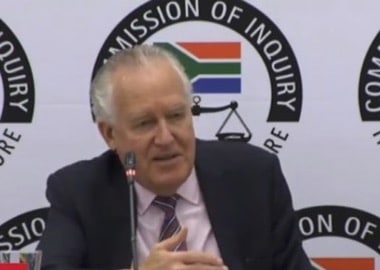Lord Peter Hain has made an extraordinary appeal to stop prosecuting Extinction Rebellion vandals, on the basis that a perverse jury verdict in a recent case acquitted six of them.
A crown court in Southwark, Central London, recently acquitted six Extinction Rebellion activists on charges of criminal damage for vandalising Shell’s London headquarters during a climate change protest in 2019.
The jury disregarded the judge, who told them that even if they thought the protesters were morally justified, it did not provide them with a lawful excuse to commit criminal damage.
Take a moment to sympathise with the seventh defendant, who pled guilty to a charge of criminal damage, presumably in the hope of earning a lesser sentence.
This surprise verdict spurred Lord Peter Hain, a former Labour MP and anti-Apartheid activist who grew up in South Africa, to pen an appeal published in the Daily Maverick to stop putting activists on trial because, he says, it isn’t in the public interest.
Pointing to a previous verdict in which protesters were convicted ‘with regret’, Hain wrote: ‘It seems that the law is out of step with the public, and that there could be many more such “perverse” verdicts by rebellious juries.’
The very idea that criminal damage should somehow be sanctioned because juries sympathise with the cause of the activists who committed it is a perversion of justice.
Property rights are – or should be – sacrosanct, and nobody has the right to damage the property of another simply to vent a political disagreement.
Precedent
Once you start accepting the principle that a sympathetic jury that votes to acquit demonstrates that ‘the law is out of step with the public’, you’re opening the door to all sorts of evils.
For the sake of argument, let’s limit ourselves to the precedent of criminal damage that does not involve assault or murder committed against a person.
Would you accept that the vandalism of an abortion clinic is justifiable, on the grounds that a sympathetic Bible Belt jury might choose to acquit the perpetrators, despite there being no defence in law for their actions?
Would you condone the vandalism of the offices of a minority political party (say, the British Labour Party) on the grounds that a jury of Tories didn’t see much wrong in protesting the clear evils of socialism by committing the lesser crime of property damage?
Should a poor person get away with keying the car of a wealthy person, simply because a jury of their peers had no sympathy for the rich?
Were the Luddites right to smash the mechanised looms that threatened their manual labour jobs? Should they have been acquitted if public sentiment supported their plight?
If union members were to go on strike against an employer with whom they have a disagreement and proceed to burn down the factory, would public sympathy with their poor working conditions justify their actions?
Extremists
The defendants in this case weren’t just out-of-control youngsters caught up in the righteous anger of a protest mob. They were all middle-aged (between 41 and 60), and had a deliberate strategy of causing sufficient damage to get the case to a crown court, rather than a lesser court. They knew exactly what they were doing. It was a premeditated crime, committed with a political purpose, and they openly celebrate members who get arrested.
The company against which they directed their ire, while far from guiltless, conducts a perfectly legal business. The vandals were of the view that this business is harmful to the planet, which may well be true, and that criminal property damage was therefore justified, which certainly is not.
By the same criteria, you could condone vandalism against the vast majority of industrial and commercial enterprises, all of whom in their business operations cause some degree of harm to the planet.
Extinction Rebellion is not just any climate change activist group. It is an extremist group that tells children they have no hope of a future and that their parents are to blame. It plays fast and loose with the facts, whipping up apocalyptic scenarios to instill mortal terror in the general public.
The fact that a lay jury, or a general public misled by their exaggerations and fabrications, sympathises with their cause does not make that cause any more just. And even if it were just, it would not justify malicious damage to property.
Mob rule
There are civilised ways in which societies make decisions that affect their members. There is public debate. There are elected legislatures. There are courts in which disagreements can be aired.
Laws can be changed and laws certainly have been changed to deal with environmental concerns, because of public pressure and scientific evidence. There are endless avenues for protest that do not involve violating the fundamental rights of others.
What Lord Hain is proposing is nothing more than mob rule. Perhaps that is not surprising, however, since he once wrote in defence of ‘libertarian socialism’, a puerile and inherently contradictory idea that promotes, well, mob rule.
Like many who daydream of socialist utopias, Hain is a proper toff, though. He is burdened with a life peerage under the title Baron Hain of Neath in the County of West Glamorgan, and is a member of one of the most exclusive and privileged clubs in the world, Her Majesty’s Privy Council.
When the revolution comes and the mob brings torches to his not insubstantial property, I shall be the first to defend it, albeit not without some schadenfreude.
The views of the writer are not necessarily the views of the Daily Friend or the IRR
If you like what you have just read, support the Daily Friend

